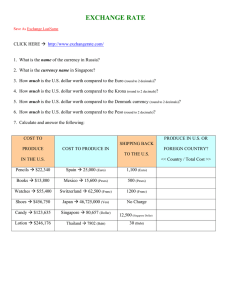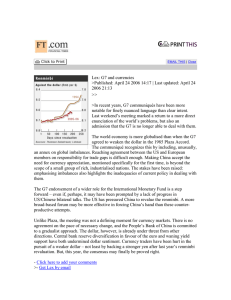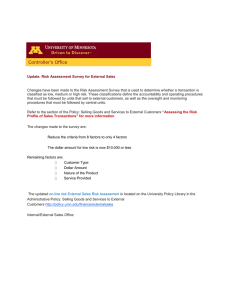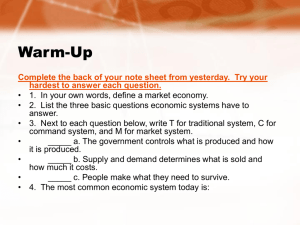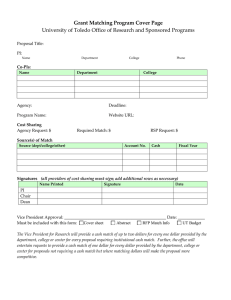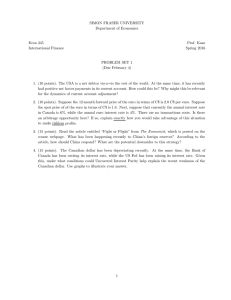Losing Currency What Happened?
advertisement
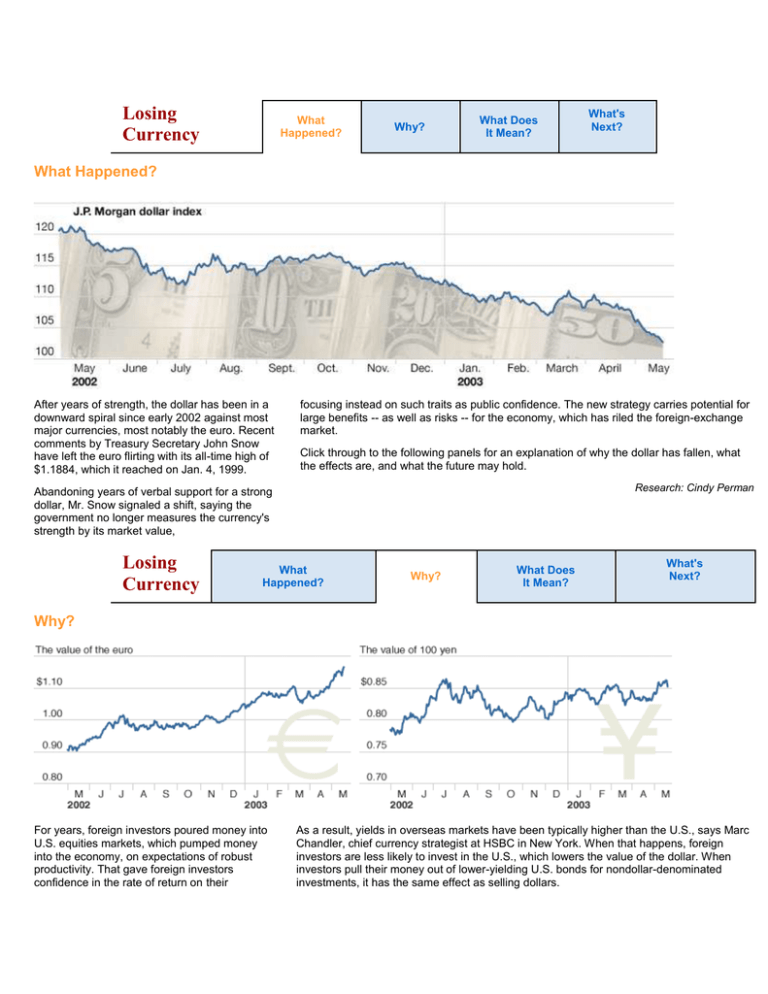
Losing Currency What Happened? Why? What Does It Mean? What's Next? What Happened? After years of strength, the dollar has been in a downward spiral since early 2002 against most major currencies, most notably the euro. Recent comments by Treasury Secretary John Snow have left the euro flirting with its all-time high of $1.1884, which it reached on Jan. 4, 1999. focusing instead on such traits as public confidence. The new strategy carries potential for large benefits -- as well as risks -- for the economy, which has riled the foreign-exchange market. Click through to the following panels for an explanation of why the dollar has fallen, what the effects are, and what the future may hold. Research: Cindy Perman Abandoning years of verbal support for a strong dollar, Mr. Snow signaled a shift, saying the government no longer measures the currency's strength by its market value, Losing Currency What Happened? Why? What Does It Mean? What's Next? Why? For years, foreign investors poured money into U.S. equities markets, which pumped money into the economy, on expectations of robust productivity. That gave foreign investors confidence in the rate of return on their As a result, yields in overseas markets have been typically higher than the U.S., says Marc Chandler, chief currency strategist at HSBC in New York. When that happens, foreign investors are less likely to invest in the U.S., which lowers the value of the dollar. When investors pull their money out of lower-yielding U.S. bonds for nondollar-denominated investments, it has the same effect as selling dollars. investment in the U.S. But then the stock-market bubble burst, corporate shenanigans unfolded, the economy's recovery sputtered, the Fed lowered interest rates to a 41-year low and the U.S. went to war, eroding that confidence, says David Mozina, head of G10 forex strategy at Bank of America in New York. Losing Currency Americans' appetites for imports has a similar impact. Buying clothing made in China, for example, effectively is the sale of dollars in exchange for goods made of yuan-denominated materials and labor. What Happened? Why? What's Next? What Does It Mean? What Does It Mean... ... for consumers? - Foreign goods now cost more here, and U.S. companies are under less pressure to keep prices low - The dollar doesn't go as far overseas, so now probably isn't the time to take that European vacation you've been putting off Italy: Then and Now Five-star Bernini Bristol hotel in Rome 11-day "Enchanting Italy" package with airfare from NYC "Rome by Night" tour with dinner 6/2002 6/2003 $398 $534 $2,199 $2,329 $59 $63 Source: Gate 1 Travel ... for investors? + A falling dollar can amplify gains earned on foreign stocks. For instance, if a stock traded in Milan rises 10% and over the same period the euro gains 10% against the dollar, an American selling the stock would benefit from the price appreciation, as well as from translating the euros from the sale to dollars. - Might stall market's recovery if confidence in the U.S. economy fails to recover and derails foreign investment ... for companies? + U.S. goods become cheaper and more attractive overseas -- good news for the struggling U.S. manufacturing sector + For companies with substantial foreign operations (like Coca-Cola which generates 80% of its operating income overseas) money generated abroad is worth more dollars when it is brought back home. - More expensive for U.S. companies to set up operations overseas ... for the economy? + Helps address the Federal Reserve's concern about deflation, or falling prices, by taking the pressure off U.S. companies to keep prices low - Too much inflation could drive up interest rates, hurt the standard of living and ultimately curb economic growth. + More foreign tourists can afford to visit the U.S. Losing Currency What Happened? Why? What What's Does Next? It Mean? What's Next? Some economists say that the dollar's value was too high and that a moderate pullback is healthy. Nevertheless, a continued decline in the dollar could further erode confidence in the U.S. economy. The European Central Bank has made it clear that it sees nothing "excessive" about the euro's current level and therefore isn't likely to intervene in the near term. The opposite is the case with the Bank of Japan, which has expressed willingness to intervene to keep the yen's strength in check. Last week, Goldman Sachs -- which for years had been expecting a decline in the dollar -upgraded its euro forecast, calling for the currency to climb as high as $1.22 in 12 months' time. HSBC pegs the chances of the euro hitting $1.20 this year at 50%. Bank of America also sees the euro in a $1.20 to $1.25 range. Letting the dollar go lower will lead to an improvement in exports, takes pricing pressures off corporations, and could boost the earnings of American companies that derive a lot of their income from overseas. But the flip side in Europe could prompt companies there to put pressure on the ECB to change its policy.
